The Crisis of Liberal Democracy and the Path Ahead
Radical Subjects in International Politics
Series Editor: Ruth Kinna
This series uses the idea of political subjection to promote the discussion and analysis of individual, communal, and civic participation and activism. Radical subjects refers both to the character of the topics and issues tacked in the series and to the ethic guiding the research. The series has a radical focus in that it provides a springboard for the discussion of activism that sits outside or on the fringes of institutional politics, yet that, insofar as it reflects a commitment to social change, is far from marginal. It provides a platform for scholarship that interrogates modern political movements, probes the local, regional, and global dimensions of activist networking and the principles that drive them, and develops innovative frames to analyze issues of exclusion and empowerment. The scope of the series is defined by engagement with the concept of the radical in contemporary politics but includes research that is multi- or interdisciplinary, working at the boundaries of art and politics, political utopianism, feminism, sociology, and radical geography.
Titles in Series:
Taking the Square: Mediated Dissent and Occupations of Public Space , edited by Maria Rovisco and Jonathan Corpus Ong
The Politics of Transnational Peasant Struggle: Resistance, Rights and Democracy , Robin Dunford
Sustainable Urbanism and Direct Action: Case Studies in Dialectical Activism , Benjamin Heim Shepard
Participation and Non-Participation in Student Activism: Paths and Barriers to Mobilizing Young People for Political Action , Alexander Hensby
The Crisis of Liberal Democracy and the Path Ahead, Bernd Reiter
Becoming a Movement: Identity and Narratives in the European Global Justice Movement , Priska Daphi (forthcoming)
The Crisis of Liberal Democracy and the Path Ahead
Bernd Reiter

Published by Rowman & Littlefield International Ltd.
Unit A, Whitacre Mews, 26-34 Stannary Street, London SE11 4AB
www.rowmaninternational.com
Rowman & Littlefield International Ltd. is an affiliate of Rowman & Littlefield
4501 Forbes Boulevard, Suite 200, Lanham, Maryland 20706, USA
With additional offices in Boulder, New York, Toronto (Canada), and Plymouth (UK)
www.rowman.com
Copyright Bernd Reiter 2017
All rights reserved . No part of this book may be reproduced in any form or by any electronic or mechanical means, including information storage and retrieval systems, without written permission from the publisher, except by a reviewer who may quote passages in a review.
British Library Cataloguing in Publication Data
A catalogue record for this book is available from the British Library
ISBN: HB 978-1-78660-364-7
PB 978-1-7866-0365-4
Library of Congress Cataloging-in-Publication Data Available
ISBN 978-1-78660-364-7 (cloth : alk. paper)
ISBN 978-1-78660-365-4 (pbk. : alk. paper)
ISBN 978-1-78660-366-1 (electronic)
 The paper used in this publication meets the minimum requirements of American National Standard for Information SciencesPermanence of Paper for Printed Library Materials, ANSI/NISO Z39.48-1992.
The paper used in this publication meets the minimum requirements of American National Standard for Information SciencesPermanence of Paper for Printed Library Materials, ANSI/NISO Z39.48-1992.
Printed in the United States of America
Contents
Quite a few people were instrumental in moving this book forward, and I am deeply indebted to them. Any intellectual production is a joint effort, and this book is not different. While I would have not been able to achieve what I have without my friends, students, and colleagues; the shortcomings and mistakes are certainly all mine.
Mark Amen read the earliest draft and provided helpful feedback. Thanks Mark! My graduate students not only inspired this work with their commentary, but some of them also read through earlier drafts and provided feedback. I want to particularly recognize and thank Felix Scholz and Cave McCoy for their efforts.
Charles Ragin encouraged and assisted me with the method I applied, which is his method. Thanks Charles! Eva Thomann took the time to not only read, but also work through my methods section, suggesting important adjustments and improvements. Thank you Eva! I would have not been able to conduct the systematic qualitative case comparison without the help and input of Deborah Cragun and Ali Bustamante. Thank you so much Deborah and Ali!
Robert Frank, Jacob Hacker, and Anthony Atkinson read through different versions and drafts of the manuscript, offering their insight and experience. Thank you!
I was able to conduct research for this book while on sabbatical from my home institution, the University of South Florida. I want to thank my chair, Steven Tauber, and the university for supporting my research efforts.
In May 2013, I was invited to join the Barcelona-based Institute for International Studies (IBEI) as their Erasmus Mundos Visiting Professor. Thanks to the generosity of Jacint Jordana, IBEI director, as well as the support from my colleagues and friends Matthias vom Hau and Fulya Apaydin, I was able to use my two months in Barcelona to conduct literature research on Spanish Anarchism. Thank you Jacint, Matthias, and Fulya!
From July to December 2013, I conducted literature research on German anarchism. Thanks to a very generous invitation by the University of Kassel, Germany, issued by Hans-Jrgen Burchardt, I was able to spend those months at the university and dedicate some time to the reading of material on the German Rte Republics. Thank you Hans-Jrgen and Stefan!
I spent the last portion of my 20132014 sabbatical in Colombia after accepting a visiting professorship at the Universidad del Norte in Barranquilla. Being in Barranquilla for six months allowed me to conduct research among indigenous and black communities of the Colombian Caribbean region. My work on the Wintukua and on Palenque de San Baslio comes closest to the traditional definition of ethnographic field workeven if in a much restricted form. Being in Colombia and having enough free time to conduct research was made possible by Roberto Arana Gonzalez, a historian at UniNorte and the director of their Institute on Latin America and the Caribbean. Thank you Roberto!
Finally, this book would not have become a reality without the support of Ruth Kinna, series editor of Rowman & Littlefield Internationals Radical Subjects in International Politics series. Thank you Ruth!
This book is for the women in my life: Mali, Miranda, and Karin. I am nothing without them.
There are two universal crises today and the two are related. One is the crisis of liberal democracy, which at its core is a crisis of political representation and of politics. Most elected representatives do not really represent us and politics has deteriorated into a spectacle the average citizen merely watches, but no longer controls. The other crisis is economic. There is no end to competition. Taken together, decreasing market returns, resource limits imposed by the global ecosystem, and the nature of relational markets impose a behavioral structure in which average people have to compete harder and harder just to keep up. Under the current capitalist model, the only possible end to this scenario is a less and less attractive world and life for more and more people. While each of these problems is serious in itself, their interaction makes them even more pernicious, as political equality is threatened by extreme economic inequality and political inequality is instrumentalized to advance economic privilege (Frank 2011).
The current state of affairs is made worse by a lack of viable alternatives and coherent visions or utopiasparticularly on the left (Albo, Gindin, and Panitch 2010). We are in a poor state of affairs indeed if socialism and communism are the only utopias we can envision. While the left seems not to have a shared vision of a viable and desirable utopia, the vision of the right, while coherent, is even less viable and attractive. Ayn Rand and her followers have a concrete proposal for improving the ethics of our times: less government, free markets, and more competition. Their message is easily understood and, thanks to massive support from the likes of the Koch Brothers, Fox News, Donald Trump, Ron Paul, Ted Cruz, and so many more, it is also broadly disseminated. It has received scientific endorsements by such known scholars as Robert Nozick, Milton Friedman, and Friedrich Hayek. After all, free markets sounds very similar to freedom in generaleven if it is not. While the rights vision is coherent, it is also callous to fellow citizens because its only answer to increased inequality seems to be it is your own fault. It is also callous to the world because it does not have an answer to the fragility of our shared ecosystem. The rights vision is also poor, as betting on selfish profit motives and hoping for the best is not a vision at all. It is based on poor science and it is morally unacceptable. More cannot be our only utopia. Not given the limited resources of this planet (Klein 2014).
Next page
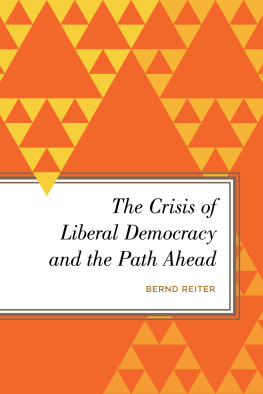

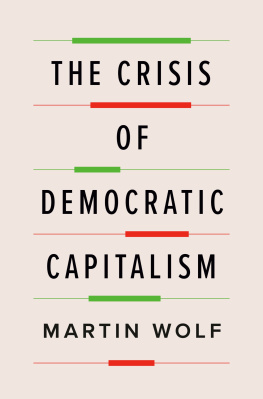
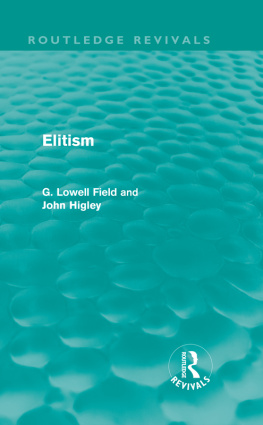
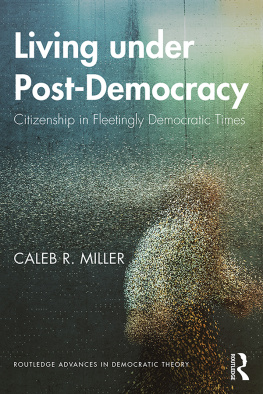
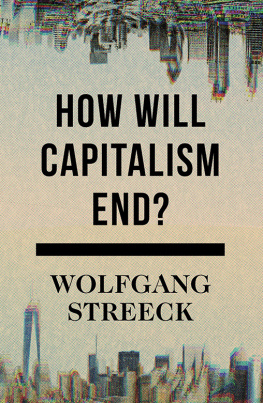
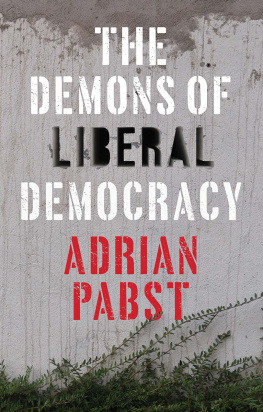
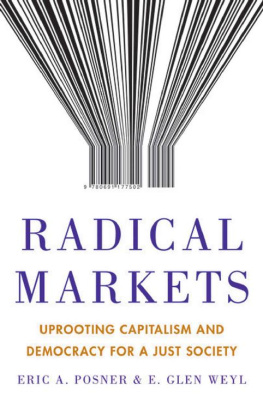
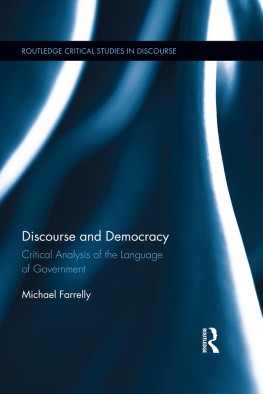


 The paper used in this publication meets the minimum requirements of American National Standard for Information SciencesPermanence of Paper for Printed Library Materials, ANSI/NISO Z39.48-1992.
The paper used in this publication meets the minimum requirements of American National Standard for Information SciencesPermanence of Paper for Printed Library Materials, ANSI/NISO Z39.48-1992.